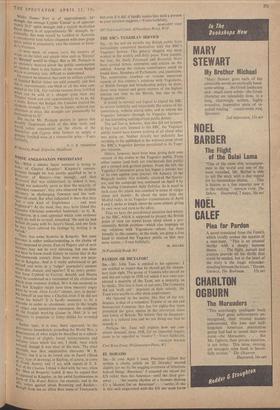make of Charles Kingsley! Kingsley's contem- poraries thought he was
poorly qualified to be a
Professor of History—true enough; and that westward Ho! was unhistorical, as indeed it was, "Inugh not noticeably more so than the majority of torical romances'; they also observed his childish effrontery in challenging Newman and the well-
deserved result. But what indication is there that they
4,4.1y a new kind of Englishman . . . and were 'ightened'? At the most,, they may have found this Chesterton, Christian somewhat hysterical : as G. K. ‘--'hesterton, in a cool appraisal which your reviewer
night do well to re-read, remarked, 'He said he had written Hypatia with his heart's blood, and one feels
e may have relieved his feelings by writing it in red ink., there was some hysteria in Kingsley. But your '`viewer is rather undiscriminating in the choice of fears supposed to prove. Fear of Popery and of mob violence may not be very elevating, but one does not have to know much history to realise that in the tl,lid-nineteenth century these fears were not pecu- liar to Kingsley. And is it really unbalanced to get `x, cited and write in a 'vulgar' journalist's manner ,anout dirt, disease, and squalor? If so, every protes- tant from Cobbett to Carlyle, Arnold, and Morris must be condensed as a forerunner of the civilisation ,Which your reviewer dislikes. Ws it not occurred to n101 that Kingsley might have been sincerely angry Wheri he wrote Alton Locke? sincere, also, in declar- Tng himself at one time a Chartist, even if he did not retain his belief? It is hardly necessary to be a neurotic in order to abominate, even to the length of VUlgar and intemperate expression, the condition of the English working classes in 1844; it is not necessary to postulate or fancy dislike for crowded - Bather later, it is true, there appeared, in the generations immedi.ately preceding the World War, a Phenomenon of what might be described as a school- „nY mixture of slightly brutal boisterousness and noticed, jokes which has not, I think, been much -°`'eckl. though it was clear at the time. The chief 2carnPle was that unattractive character W. E. p enleY: but it is to he found also in Punch ('Stout ,„,.artY' type of drawing), in Kipling, of course, in some Prank Anstey, and (I say with regret) in E. F. tt'ha of the Clarion. I think it died with the war, when it c Man of Property', faded. It may be argued that ,
PP‘ared in Kingsley, in the awful facetiousness in Parts of The Water Babies, for example, and in the verses quoted about Browning and Ruskin— "ugh these are no sillier than some of Tennyson's: but even if it did, it hardly makes him such a por as your reviewer suggests.—Yours faithfully, MARGARET COLE 107 Oakwood Court, A bbotsbury Road, W14










































 Previous page
Previous page